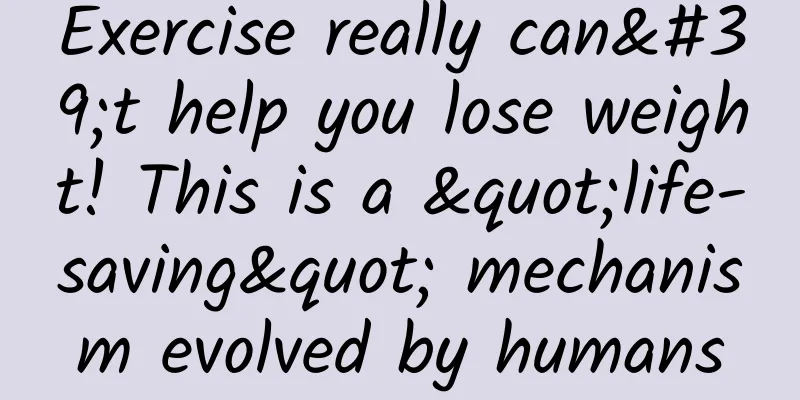Exercise really can't help you lose weight! This is a "life-saving" mechanism evolved by humans

|
The metabolic engine we have evolved over millions of years is not designed to keep us in shape. The Hadza tribe in Tanzania has more than 1,300 people and is considered the last tribe in Africa that still lives on hunting and gathering. The Hadza people's daily life is extremely intensive. In order to obtain food, Hadza women walk an average of 8 kilometers a day, and men walk 14 kilometers, which is more than the average modern human walks in a week. Many people believe that the Hadza people are so active that their daily energy consumption must be very high, but this is not the case. In order to understand the specific energy expenditure of the Hadza people, Herman Pontzer, now an associate professor of evolutionary anthropology at Duke University, and his colleagues conducted a study in 2012. They asked the Hadza subjects to drink isotope-labeled water with deuterium and carbon-18 replacing the original hydrogen and oxygen, and collected their urine for analysis. Copyright image, no permission to reprint After adjusting for weight, they found that the average daily total energy expenditure (TEE) of the Hadza people, both men and women, was very close to that of men and women in the general world, and a lot of physical activity did not increase their daily total energy expenditure (TEE). At the same time, other studies of Hadza hunter-gatherers have not found anything unusual. Pontzer and his colleagues published this study in PLOS One. "This result is unexpected, given the huge differences in exercise expenditure," said Dale Schoeller, a physiologist at UW Madison. After exercise, the body's other consumption will spontaneously decrease Pontzer believes that the Hadza have changed the way they expend energy. During processes such as inflammation and stress responses, the Hadza bodies may have reduced their energy expenditure, which prevented their TEE from increasing. Research data from other teams also support this view: after weeks of half-marathon training for sedentary women, their daily energy expenditure barely increased compared to when they first started training. Studies on marathon runners have also reached similar conclusions: as training time goes on, the energy consumed by athletes gradually decreases from 6,200 calories per day to 4,900 calories. Pontzer pointed out that as athletes run more and more over weeks or months, although the energy consumed by exercise increases, the metabolism of other aspects of the body will also slow down accordingly to "make room" for the needs of exercise, and eventually reach a balance. Copyright image, no permission to reprint "The metabolic engine we've evolved over millions of years wasn't built to maintain a bikini body for the beach." —— Herman Pontzer Reasonable evolutionary results would not allow strenuous exercise to have a significant impact on a person's TEE. "This is Pontzer's most interesting and controversial idea," said Daniel Lieberman, a paleoanthropologist at Harvard University and Pontzer's former mentor. He gave a simple example: "Suppose I ran 5 miles this morning and consumed about 500 calories. In the simplest model, my TEE today would also increase by 500 calories... But according to Herman Pontzer's conclusion, the TEE of more active people would not be as high as predicted by the simple model. It's just that we don't understand how this balance process occurs yet." Can you lose weight by being a couch potato as long as you eat less? People who care about weight changes may interpret this study from another perspective: since weight gain or loss depends on the difference between the energy in the food you eat and the energy consumed by the body, and TEE is basically constant - even if you are a couch potato who never exercises, you may consume almost the same amount of energy every day, and you will not gain weight simply because you do not exercise. However, John Thyfault, an exercise physiologist at the University of Kansas, warned that although eating less and moving less may also control weight, such "lying flat" does more harm than good. Exercise can affect where fat is stored in the body, so exercising while controlling diet can be more effective in losing weight. More importantly, exercise has a significant impact on risks such as diabetes and heart disease. Copyright image, no permission to reprint Pontzer's research on the Hadza people also confirms this: due to continuous exercise, many 70-80-year-old Hadza people are still in good health and rarely suffer from diabetes or heart disease. He pointed out that health guidance related to weight control must not be generalized, otherwise it is likely to mislead dieters - dieting is the most direct tool for controlling weight, but exercise is also essential to keep the body healthy. Pontzer also proposed a hypothesis about the mechanism by which the body spontaneously balances TEE - "The hunting and gathering activities of the Hadza people did not increase daily calorie burn, but changed the way they consumed calories," especially in some invisible tasks, such as inflammation and stress response. Preliminary studies have shown that mental stress from activities such as math tests and interviews can increase energy consumption by 30% - 40%. Pontzer's team will further explore the mechanism by which the body inhibits these activities. "We believe that the body's spontaneous lever adjustment after exercise can reduce inflammation and stress response. Although some people are skeptical about this, we have a responsibility to conduct the next stage of experiments." Source: Research Circle (ID: keyanquan) Compiled by: Wu Dake The watermarked images in this article are from the copyright gallery, and the image content is not authorized for reprinting References: https://www.science.org/content/article/scientist-busts-myths-about-how-humans-burn-calories-and-why https://scholars.duke.edu/display/pub1323585 https://www.science.org/content/article/study-marathon-runners-reveals-hard-limit-human-endurance |
>>: Be careful when eating spring vegetables! Save this guide to tasting fresh vegetables →
Recommend
How to optimize the fission process? Let the traffic burst
Recently some friends asked me how to do fission ...
Is the popular Klein blue a magic weapon for making whiter skin appear brighter, or does it make yellow look even more yellow?
57 years ago, an art exhibition was held in Milan...
Can’t retain users? Try these 9 activation techniques
The work of "promoting activation" is n...
The most comprehensive information flow advertising channels and techniques in 2019!
Recently, we have summarized the characteristics ...
2022 Chengdu Tea Tasting Private WeChat Good Places for Drinking Tea
Private WeChat appointment arrangements for Cheng...
After so many years, why are mobile phone batteries still 3000 mAh?
[[127862]] If a smartphone with a battery life of...
Agan talks about cross-border Amazon operations
Cross-border learning is not just a PPT with audi...
Searching for the "eyes" underground: seismic exploration technology
There is a way to do a "physical examination...
In search of "Earth 2.0", Chinese scientists propose a sky survey plan
◎ Science and Technology Daily reporter Jin Feng ...
Lithium batteries are not the way to go. Japanese and Korean companies say hydrogen fuel is the future of new energy vehicles?
The emergence of iOS and Android phones completel...
The boy lit four mosquito coils and was "poisoned". Are mosquito coils so toxic?
Audit expert: Gu Haitong Deputy Chief Physician, ...
How to choose a reliable Douyin agent?
Weibo, Weibo and Douyin have become the standard ...
How Tik Tok acquires traffic and how to increase it!
Today I want to share with you how companies can ...
What is Momo? King of Glory is the biggest hookup platform in China!
Yes, Honor of Kings , a mobile game , seems to ha...
Combining sports car performance with sedan practicality, the Audi A5 Sportback represents the ultimate lifestyle attitude
As the most popular entry-level coupe, the mid-te...









